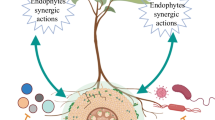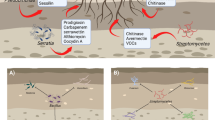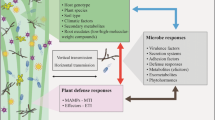Abstract
Symbionts participate in various physiological activities of their insect hosts, including detoxification metabolism. Emerging evidence has revealed that the bacterial symbiont Arsenophonus is involved in insecticide detoxification metabolism of Nilaparvata lugens, which harbors diverse symbionts. However, it is still unknown whether other bacterial symbionts have a functional role in this process. This study showed that pretreatment with antibiotics significantly increased N. lugens susceptibility to imidacloprid, chlorpyrifos, and clothianidin, and the detoxifying enzyme activities of the cytochrome P450 enzyme (P450) and glutathione S-transferase (GST) were significantly inhibited. Notably, the P450 genes NlCYP6ER1 and NlCYP4CE1, which are related to imidacloprid metabolism, were dramatically downregulated in ciprofloxacin- and tetracycline-pretreated N. lugens, respectively. Furthermore, the expression levels of various detoxifying genes (GSTs and P450s) were significantly positively correlated with Wolbachia, Arsenophonus, Acinetobacter, and Staphylococcus. These results indicated that bacterial symbionts may affect insecticide metabolism by regulating the expression of the insect host’s GST and P450 genes, and provide a foundation for further study on the mechanism of symbiont-mediated host detoxification metabolism in insect pests.







Similar content being viewed by others
References
Adams AS, Aylward FO, Adams SM et al (2013) Mountain pine beetles colonizing historical and naïve host trees are associated with a bacterial community highly enriched in genes contributing to terpene metabolism. Appl Environ Microbiol 79:3468–3475. https://doi.org/10.1128/AEM.00068-13
Alam A, Leoni G, Wentworth CC et al (2014) Redox signaling regulates commensal-mediated mucosal homeostasis and restitution and requires formyl peptide receptor. Mucosal Immunol 7:645–655. https://doi.org/10.1038/mi.2013.84
APRD (2019) Arthropod pesticide resistance database. http://www.pesticideresistance.org. Accessed 29 Oct 2019
Baumann P (2005) Biology of bacteriocyte-associated endosymbionts of plant sap-sucking insects. Annu Rev Microbiol 9:155–189. https://doi.org/10.1146/annurev.micro.59.030804.121041
Benoit JB, Vigneron A, Broderick NA et al (2017) Symbiont-induced odorant binding proteins mediate insect host hematopoiesis. eLife 6:e19535. https://doi.org/10.7554/eLife.19535
Berticat C, Rousset F, Raymond M et al (2002) High Wolbachia density in insecticide-resistant mosquitoes. Proc R Soc B Biol Sci 269:1413–1416. https://doi.org/10.1098/rspb.2002.2022
Cai T, Zhang Y, Liu Y et al (2020) Wolbachia enhances expression of NlCYP4CE1 in Nilaparvata lugens in response to imidacloprid stress. Insect Sci. https://doi.org/10.1111/1744-7917.12834
Cheng D, Guo Z, Riegler M et al (2017) Gut symbiont enhances insecticide resistance in a significant pest, the oriental fruit fly Bactrocera dorsalis (Hendel). Microbiome 5:1–12. https://doi.org/10.1186/s40168-017-0236-z
Denman SE, McSweeney CS (2006) Development of a real-time PCR assay for monitoring anaerobic fungal and cellulolytic bacterial populations within the rumen. FEMS Microbiol Ecol 58:572–582. https://doi.org/10.1111/j.1574-6941.2006.00190.x
Douglas AE (1998) Nutritional Interactions in Insect-Microbial Symbioses: aphids and Their Symbiotic Bacteria Buchnera. Annu Rev Entomol 43:17–37. https://doi.org/10.1146/annurev.ento.43.1.17
Douglas AE (2009) The microbial dimension in insect nutritional ecology. Funct Ecol 23:38–47. https://doi.org/10.1111/j.1365-2435.2008.01442.x
Douglas AE, Minto LB, Wilkinson TL (2001) Quantifying nutrient production by the microbial symbionts in an aphid. J Exp Biol 204:349–358
Febvay G, Rahbé Y, Rynkiewicz M et al (1999) Fate of dietary sucrose and neosynthesis of amino acids in the pea aphid, Acyrthosiphon pisum, reared on different diets. J Exp Biol 202:2639–2652
Fu Q, Zhang Z, Hu C et al (2001) A chemically defined diet enables continuous rearing of the brown planthopper, Nilaparvata lugens (Stål) (Homoptera: Delphacidae). Appl Entomol Zool 36:111–116. https://doi.org/10.1303/aez.2001.111
Ghanim M, Kontsedalov S (2009) Susceptibility to insecticides in the Q biotype of Bemisia tabaci is correlated with bacterial symbiont densities. Pest Manag Sci 65:939–942. https://doi.org/10.1002/ps.1795
Ghosh S, Bouvaine S, Richardson SCW et al (2018) Fitness costs associated with infections of secondary endosymbionts in the cassava whitefly species Bemisia tabaci. J Pest Sci 91:17–28. https://doi.org/10.1007/s10340-017-0910-8
Hannula SE, Zhu F, Heinen R, Bezemer TM (2019) Foliar-feeding insects acquire microbiomes from the soil rather than the host plant. Nat Commun 10:1–9. https://doi.org/10.1038/s41467-019-09284-w
Hussain M, Frentiu FD, Moreira LA et al (2011) Wolbachia uses host microRNAs to manipulate host gene expression and facilitate colonization of the dengue vector Aedes aegypti. Proc Natl Acad Sci U S A 108:9250–9255. https://doi.org/10.1073/pnas.1105469108
Itoh H, Hori T, Sato Y et al (2018) Infection dynamics of insecticide-degrading symbionts from soil to insects in response to insecticide spraying. ISME J 12:909–920. https://doi.org/10.1038/s41396-017-0021-9
Itoh H, Tago K, Hayatsu M, Kikuchi Y (2018) Detoxifying symbiosis: microbe-mediated detoxification of phytotoxins and pesticides in insects. Nat Prod Rep 35:434–454. https://doi.org/10.1039/c7np00051k
Jin R, Mao K, Liao X et al (2019) Overexpression of CYP6ER1 associated with clothianidin resistance in Nilaparvata lugens (Stål). Pestic Biochem Physiol 154:39–45. https://doi.org/10.1016/j.pestbp.2018.12.008
Jones RM, Desai C, Darby TM et al (2015) Lactobacilli modulate epithelial cytoprotection through the Nrf2 pathway. Cell Rep 12:1217–1225. https://doi.org/10.1016/j.celrep.2015.07.042
Jones RM, Luo L, Ardita CS et al (2013) Symbiotic lactobacilli stimulate gut epithelial proliferation via Nox-mediated generation of reactive oxygen species. EMBO J 32:3017–3028. https://doi.org/10.1038/emboj.2013.224
Kabaria S, Choi DC, Chaudhuri AD et al (2015) MicroRNA-7 activates Nrf2 pathway by targeting Keap1 expression. Free Radic Biol Med 89:548–556. https://doi.org/10.1016/j.freeradbiomed.2015.09.010
Kandil MM, Trigo C, Koskinen WC, Sadowsky MJ (2015) Isolation and characterization of a novel imidacloprid-degrading Mycobacterium sp. Strain mk6 from an egyptian soil. J Agric Food Chem 63:4721–4727. https://doi.org/10.1021/acs.jafc.5b00754
Kang MJ, Kim HG, Kim JS et al (2013) The effect of gut microbiota on drug metabolism. Expert Opin Drug Metab Toxicol 9:1295–1308. https://doi.org/10.1517/17425255.2013.807798
Kikuchi Y, Hayatsu M, Hosokawa T et al (2012) Symbiont-mediated insecticide resistance. Proc Natl Acad Sci U S A 109:8618–8622. https://doi.org/10.1073/pnas.1200231109
Kikuchi Y, Tada A, Musolin DL et al (2016) Collapse of insect gut symbiosis under simulated climate change. MBio 7:e01578-e1616. https://doi.org/10.1128/mBio.01578-16
Lee JB, Park KE, Lee SA et al (2017) Gut symbiotic bacteria stimulate insect growth and egg production by modulating hexamerin and vitellogenin gene expression. Dev Comp Immunol 69:12–22. https://doi.org/10.1016/j.dci.2016.11.019
Ley RE, Bäckhed F, Turnbaugh P et al (2005) Obesity alters gut microbial ecology. Proc Natl Acad Sci U S A 102:11070–11075. https://doi.org/10.1073/pnas.0504978102
Liao X, Jin R, Zhang X et al (2019) Characterization of sulfoxaflor resistance in the brown planthopper, Nilaparvata lugens (Stål). Pest Manag Sci 75:1646–1654. https://doi.org/10.1002/ps.5282
Liu Z, Williamson MS, Lansdell SJ et al (2005) A nicotinic acetylcholine receptor mutation conferring target-site resistance to imidacloprid in Nilaparvata lugens (brown planthopper). Proc Natl Acad Sci U S A 102:8420–8425. https://doi.org/10.1073/pnas.0502901102
Livak KJ, Schmittgen TD (2001) Analysis of relative gene expression data using real-time quantitative PCR and the 2-ΔΔCT method. Methods 25:402–408. https://doi.org/10.1006/meth.2001.1262
Mao K, Jin R, Li W et al (2019) The influence of temperature on the toxicity of insecticides to Nilaparvata lugens (Stål). Pestic Biochem Physiol 156:80–86. https://doi.org/10.1016/j.pestbp.2019.02.009
Mao K, Zhang X, Ali E et al (2019) Characterization of nitenpyram resistance in Nilaparvata lugens (Stål). Pestic Biochem Physiol 157:26–32. https://doi.org/10.1016/j.pestbp.2019.03.001
Martino ME, Joncour P, Leenay R et al (2018) Bacterial adaptation to the host’s diet is a key evolutionary force shaping Drosophila-Lactobacillus symbiosis. Cell Host Microbe 24:109–119. https://doi.org/10.1016/j.chom.2018.06.001
Montenegro H, Petherwick AS, Hurst GDD, Klaczko LB (2006) Fitness effects of Wolbachia and Spiroplasma in Drosophila melanogaster. Genetica 127:207–215. https://doi.org/10.1007/s10709-005-3766-4
Natividad JM, Agus A, Planchais J et al (2018) Impaired aryl hydrocarbon receptor ligand production by the gut microbiota is a key factor in metabolic syndrome. Cell Metab 28:737-749.e4. https://doi.org/10.1016/j.cmet.2018.07.001
Nikolouli K, Colinet H, Renault D et al (2018) Sterile insect technique and Wolbachia symbiosis as potential tools for the control of the invasive species Drosophila suzukii. J Pest Sci 91:489–503
Oliver KM, Russell JA, Morant NA, Hunter MS (2003) Facultative bacterial symbionts in aphids confer resistance to parasitic wasps. Proc Natl Acad Sci U S A 100:1803–1807. https://doi.org/10.1073/pnas.0335320100
Pang R, Chen M, Yue L et al (2018) A distinct strain of Arsenophonus symbiont decreases insecticide resistance in its insect host. PLoS Genet 14:e1007725. https://doi.org/10.1371/journal.pgen.1007725
Pavlidi N, Gioti A, Wybouw N et al (2017) Transcriptomic responses of the olive fruit fly Bactrocera oleae and its symbiont Candidatus Erwinia dacicola to olive feeding. Sci Rep 7:42633. https://doi.org/10.1038/srep42633
Pietri JE, Liang D (2018) The links between insect symbionts and insecticide resistance: causal relationships and physiological tradeoffs. Ann Entomol Soc Am 111:92–97. https://doi.org/10.1093/aesa/say009
Prieto A, Möder M, Rodil R et al (2011) Degradation of the antibiotics norfloxacin and ciprofloxacin by a white-rot fungus and identification of degradation products. Bioresour Technol 02:10987–10995. https://doi.org/10.1016/j.biortech.2011.08.055
Sabree ZL, Kambhampati S, Moran NA (2009) Nitrogen recycling and nutritional provisioning by Blatta bacterium, the cockroach endosymbiont. Proc Natl Acad Sci U S A 106:19521–19526. https://doi.org/10.1073/pnas.0907504106
Singh BK, Walker A, Morgan JAW, Wright DJ (2003) Effects of soil pH on the biodegradation of chlorpyrifos and isolation of a chlorpyrifos-degrading bacterium. Appl Environ Microbiol 69:5198–5206. https://doi.org/10.1128/AEM.69.9.5198-5206.2003
Snodgrass GL, Adamczyk JJ, Gore J (2005) Toxicity of insecticides in a glass-vial bioassay to adult brown, green, and southern green stink bugs (Heteroptera: Pentatomidae). J Econ Entomol 98:177–181. https://doi.org/10.1093/jee/98.1.177
Soltani A, Vatandoost H, Oshaghi MA et al (2017) The role of midgut symbiotic bacteria in resistance of Anopheles stephensi (Diptera: Culicidae) to organophosphate insecticides. Pathog Glob Health 111:289–296. https://doi.org/10.1080/20477724.2017.1356052
Stouthamer R, Breeuwer JAJ, Hurst GDD (1999) Wolbachia Pipientis: microbial manipulator of arthropod reproduction. Annu Rev Microbiol 53:71–102. https://doi.org/10.1146/annurev.micro.53.1.71
Trinder M, McDowell TW, Daisley BA et al (2016) Probiotic lactobacillus rhamnosus reduces organophosphate pesticide absorption and toxicity to Drosophila melanogaster. Appl Environ Microbiol 82:6204–6213. https://doi.org/10.1128/AEM.01510-16
Vontas JG, Small GJ, Nikou DC et al (2002) Purification, molecular cloning and heterologous expression of a glutathione S-transferase involved in insecticide resistance from the rice brown planthopper, Nilaparvata lugens. Biochem J 362:329–337. https://doi.org/10.1042/0264-6021:3620329
Wang SB, Qu S (2017) Insect symbionts and their potential application in pest and vector-borne disease control. Bull Chin Acad Sci 8:863–872
Werren JH, Baldo L, Clark ME (2008) Wolbachia: Master manipulators of invertebrate biology. Nat Rev Microbiol 6:741–751
Zhang G, Hussain M, O’Neill SL, Asgari S (2013) Wolbachia uses a host microRNA to regulate transcripts of a methyltransferase, contributing to dengue virus inhibition in Aedes aegypti. Proc Natl Acad Sci U S A 110:10276–10281. https://doi.org/10.1073/pnas.1303603110
Zhang X, Mao K, Liao X et al (2018) Fitness cost of nitenpyram resistance in the brown planthopper Nilaparvata lugens. J Pest Sci 91:1145–1151. https://doi.org/10.1007/s10340-018-0972-2
Zhang Y, Tang T, Li W et al (2018) Functional profiling of the gut microbiomes in two different populations of the brown planthopper, Nilaparvata lugens. J Asia Pac Entomol 21:1309–1314. https://doi.org/10.1016/j.aspen.2018.09.012
Zhang Y, Yang Y, Sun H, Liu Z (2016) Metabolic imidacloprid resistance in the brown planthopper, Nilaparvata lugens, relies on multiple P450 enzymes. Insect Biochem Mol Biol 79:50–56. https://doi.org/10.1016/j.ibmb.2016.10.009
Acknowledgements
This work was supported by the National Natural Science Foundation of China (31871991), the Natural Science Foundation of Hubei Province (2019CFB471) and the Fundamental Research Funds for the Central Universities (2662018JC049).
Author information
Authors and Affiliations
Contributions
HW, JHL and SH conceived and designed the experiments. TT, YHZ and TWC conducted the experiments. XQD, CYL and JML analyzed the data. HW, TT and YHZ wrote the manuscript. All authors read, corrected, and approved the manuscript.
Corresponding author
Ethics declarations
Conflict of interest
The authors declare that they have no conflict of interest.
Ethical approval
This article does not contain any studies with human participants or animals performed by any of the authors.
Additional information
Communicated by Emmanouil Roditakis.
Publisher's Note
Springer Nature remains neutral with regard to jurisdictional claims in published maps and institutional affiliations.
Electronic supplementary material
Below is the link to the electronic supplementary material.
Rights and permissions
About this article
Cite this article
Tang, T., Zhang, Y., Cai, T. et al. Antibiotics increased host insecticide susceptibility via collapsed bacterial symbionts reducing detoxification metabolism in the brown planthopper, Nilaparvata lugens. J Pest Sci 94, 757–767 (2021). https://doi.org/10.1007/s10340-020-01294-8
Received:
Revised:
Accepted:
Published:
Issue Date:
DOI: https://doi.org/10.1007/s10340-020-01294-8




